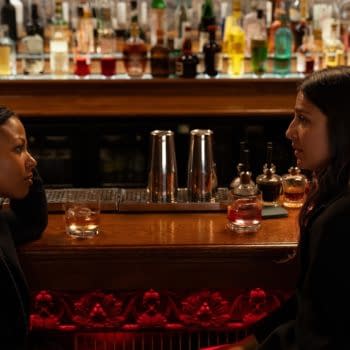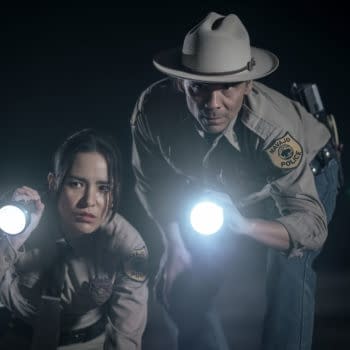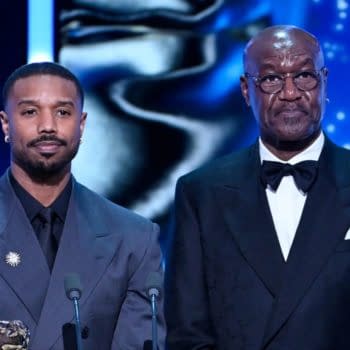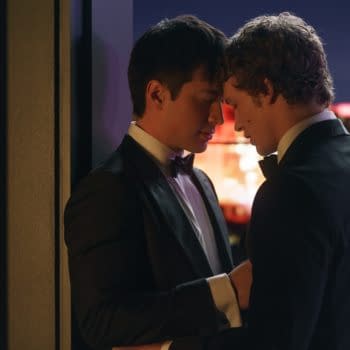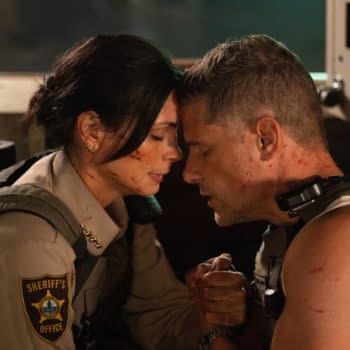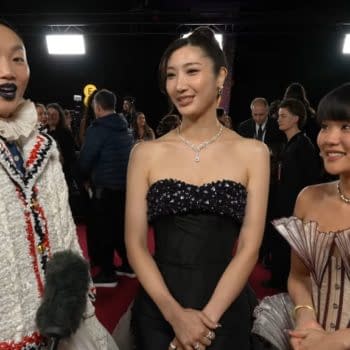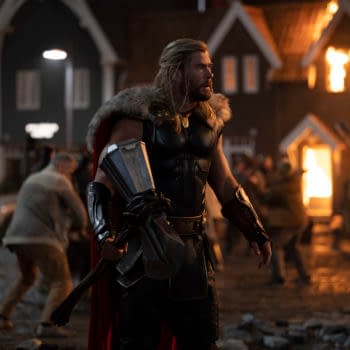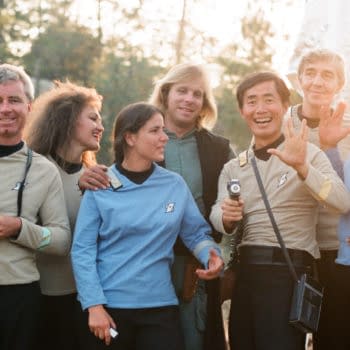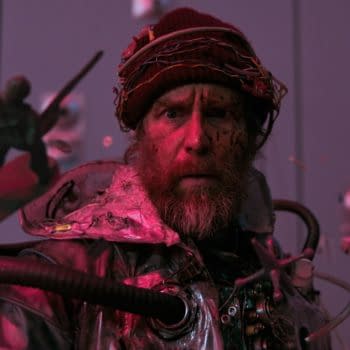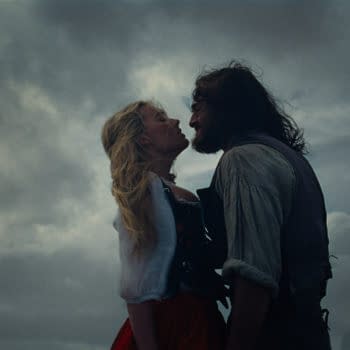Posted in: Current News, Editor's Picks TV News, Movies, Netflix, Recent Updates, Review, TV, YouTube | Tagged: anna torv, Bill Tench, cable, Ceán Chaffin, charlize theron, david fincher, Dr. Ann Wolbert Burgess, Episode 1, Erik Messerschmidt, fbi, hannah gross, Holden Ford, Holt McCallany, Jim Davidson, John E. Douglas, jonathan groff, Josh Donen, mark olshaker, Mind Hunter: Inside the FBI's Elite Serial Crime Unit, mindhunter, netflix, profilers, profiling, Robert K. Ressler, Season 1, serial killers, streaming, television, tv
Mindhunter Episode 1 Takeaways: "What Keeps Us All Awake At Night?"
Netflix takes us back to the early days of criminal psychology and profiling at the Federal Bureau of Investigation with Mindhunter, executive producer/director David Fincher's new crime drama/thriller series that dropped it's entire ten-episode first season on the streaming giant on October 13.
So starting this week and for the next five weeks, we're going to look at the takeaways from each episode and see if Fincher (director of Episodes 1 and 2) is still up to Seven and Fight Club form; of if he's serving up nothing more than a mediocre, big budget History Channel documentary.
https://www.youtube.com/watch?v=7gZCfRD_zWE
So here's what Netflix has to say about Mindhunter Episode 1, directed by Fincher and written by Joe Penhall:
"In 1977, frustrated FBI hostage negotiator Holden Ford finds an unlikely ally in veteran agent Bill Tench and begins studying a new class of murderer."
● Groff's Holden Ford comes across like what you would get if you put Fox Mulder, Dale Cooper, Dr. Gregory House and Sherlock Holmes into a blender and then strained it through a dry sense of humor and some semblance of of social skills. He's the ultimate "government rebel," working from within the FBI to dramatically alter the way the feds approach investigating violent acts and those that perpetrate them. For Holden, it's not enough that "only" Cody Miller dies during the hostage negotiations at the beginning of the episode ("If I did everything by the book, then it begs the question…"); it's about having the knowledge to prevent any loss of life. Both Fincher and cinematographer Erik Messerschmidt do an amazing job showing us a Holden who just can't wash the blood off (his sleeves) no matter how hard he tries, and he's been paying for it with his sleep.
● The chemistry Gross' Deborah 'Debbie' Mitford and Holden was one of my favorite parts of this episode, and a relationship that I look forward to seeing develop over her time. It would be easy to think of Debbie as the opposite of Holden when it comes to the societal issues of the time, but I don't believe that does justice to their dynamic.
Debbie is as smart if not smarter than Holden, making a point of proving that to him firsthand at the bar when they first meet. She won't allow herself to be defined by the stereotypes of the times, evident in how she questions Holden on his thoughts on what she's wearing and what he believe that means about her. I see Debbie more as a experiential "gateway drug" for Holden, helping him expand his way of thinking beyond the walls of the FBI and into areas of theory that will prove invaluable.
Hell, in the span of one night she broadens his horizons when it comes to music, deviancy theory and weed.
● Speaking of relationships, Holden and Bill Tench (Holt McCallany) are already showing the makings of a "big brother/little brother relationship." Tench sees a kindred spirit in Holden, but one that needs guidance and a realistic on-the-ground perspective; so Holden joins Tench as he travels to Iowa, and it's also where Holden gets his first lesson.
Tench is there to educate the local police on new FBI investigative practices; and in return, he learns from those officers what it is they've been facing on the ground. He's able to connect with these officers on a personal level in a way that Holden doesn't have yet; and it shows in how poorly the officers respond to his presentation with the Charles Manson finale. Tench counsels Holden to get to know the officers that he'll be working with and to think of things through their eyes when he talks to them about motiveless killers.
But "subtlety" and "basic social graces" are concepts still a little lost on Holden, who gets waves of attitude from Tench one more time before the episode ends. Detective Frank McGraw apologizes for going after Holden and his presentation during class, asking Holden and Tench for help with his current case: a woman who worked at the local church and her child were bound, brutally murdered and sexually assaulted. As Holden continues to ask questions of McGraw, he soon realizes that neither he nor Tench have the skills necessary to help with the case. Big problem. Because in his panic over feeling outgunned on the case, Holden tells McGraw that they're not equipped to help him before abruptly leaving. Needless to say, Tench was not happy about Holden's decision; yet was still able to offer Holden some sound (if not seething) brotherly advice:
Bill Tench: Let me ask you something else. Do you have a girlfriend?
Holden Ford: I do now, Bill, as it happens.
Bill Tench: Okay. So next time you're a long way from home and you flip your shit, you find a pay phone and you tell it to your girlfriend. Okay?
Holden Ford: Okay.
Bill Tench: How's that sound?
Holden Ford: It sounds okay, Bill.
● One thing that Fincher doesn't get enough appreciation for is the dry humor in his works, and Penhall really did an amazing job creating scenarios where you find yourself smiling and feeling bad about it at the same time, whether it's the "jive talk" roleplay scene or Holden's first experience with weed. It helped me connect with the characters quickly, and made it easier to commit character and supporting character names to memory.
● There were a couple of historical "geek" moments that were worthy of mention, including how the episode pitched the argument that a post-Watergate cultural and societal shift was a major influence in the increase in motiveless crimes. It was also interesting to see how heavy distrust directed towards the government in the late '70's impacted departments like the FBI from getting some of the best and brightest to advise them distrust towards the government in the late '70's In a flip to the normal movie cliche of local police not liking the involvement of the feds, local police were actually more receptive to the investigative techniques Holden and Tench were advocating than their own FBI.
● Best quote of the episode:
Holden Ford: You get onto a crowded elevator, and you face the opposite direction, the back of the elevator, and everybody freaks out. They're uncomfortable for reasons they can't even articulate. But if you turn around and face the front, everybody relaxes.
Bill Tench: Okay. Well, how do we do that?
Holden Ford: What do we have in common? What unites us? What keeps us all awake at night?
● Let's not forget the killer soundtrack, which included: Crying (Don McLean); Do You Feel Like We Do (Live) [Remix] (Peter Frampton); Hold the Line (Toto); and I'm Not in Love (10cc). Just like American Gods, so far the show is going with songs that fit the episode instead of trying to have the episode fit the songs.
So let me know what takeaways you got from the inaugural episode, and we'll be back for Mindhunter Episode 2!

Created by Penhall, Mindhunter spotlights FBI agents Holden Ford (Jonathan Groff) and Bill Tench (Holt McCallany), who interview imprisoned serial killers in order to understand how such their minds work; and how that knowledge can be applied to prevent future loss of lives. Groff's Holden Ford is based on FBI agent John E. Douglas, who co-authored the book (with Mark Olshaker) that the series is using as its source material: Mind Hunter: Inside the FBI's Elite Serial Crime Unit. McCallany's Bill Tench is based on FBI agent Robert K. Ressler, who is often credited with having coined the term "serial killer."
Mindhunter also stars Hannah Gross as Deborah 'Debbie' Mitford, Holden's girlfriend and a post-grad student at University of Virginia; Anna Torv as Dr. Wendy Carr, a psychologist (based on Dr. Ann Wolbert Burgess); and Cotter Smith as Shepard, unit chief of the FBI National Training Academy. Fincher, Charlize Theron, Josh Donen and Ceán Chaffin serve as executive producers, with producer Jim Davidson and cinematographer Erik Messerschmidt working through Denver and Delilah Productions.












